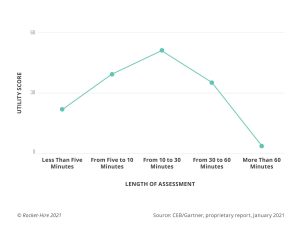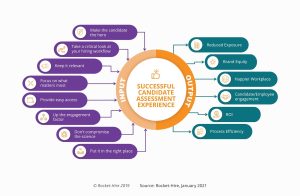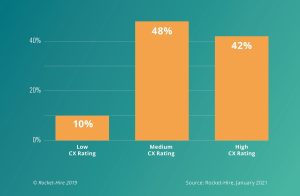Assessments create a poor candidate experience. It’s a charge many of us have heard many times. Here’s the truth, though: The charge is valid — but only when assessments are poorly designed or used.
So here’s another truth: While no one likes taking tests, it is a myth that assessments by default create a poor candidate experience. As a result of being unfairly villainized for having a negative impact on candidate experience, in the last few years employers have become fixated on the perceived need for ultra-short assessments. Their aim has been to keep candidates’ attention and hedge against perceptions of poor employment brands.
Rocket-Hire recently completed research into trends in the talent assessment market, which included reviewing and classifying over 245 vendors of predictive hiring tools on multiple parameters, including candidate experience. Here’s what the findings, along with those of previous research, reveal:
Candidates value the opportunity to demonstrate their job-relevant skills more than they fixate on the length of an assessment or its entertainment factor. For instance, recent studies by the Talent Board found that the extent to which employers enable candidates to show their job-relevant skills, knowledge, and experience during the application process is directly related to important emotional outcomes. Specifically:
- Candidates who had the opportunity to complete simulated job tasks were 60% more likely to increase their relationship with the employer than those who didn’t.
- Candidates who experience a job-related simulation have a 25% higher satisfaction rate than those who do not.
Thus, when it comes to the length of an assessment, the idea that candidates will immediately devalue any employer that asks them to dedicate more than 10 minutes to completing one is a falsehood.
Additionally, according to a recent research report by Gartner describing how candidates interpret the value of assessments, people almost universally trust assessments that are generally between 10 and 30 minutes. Furthermore, candidates feel negatively about assessments that are too long (over 30 minutes) — or too short (five minutes or less).

Then there’s the issue of relevance. While there is a general belief that the fun factor of game-based assessments make them attractive to candidates, according to Gartner’s research (below), this is clearly not the case. Games and puzzles are the least preferred type of assessment, beating out drug-testing for this top honor.

“Candidates may not like these types of assessment because they often seem unrelated to the job and diminish the seriousness of the life decision a candidate faces in a hiring process,” Gartner explains. “Given those datasets, assessments should be highly job relevant.”
There are many factors besides assessment length and perceived fun factor that significantly impact candidate experience. Indeed, the model below identifies eight key areas that influence candidates’ experience with assessments.

Candidates’ feelings about assessments have less to do with the assessments themselves and more to do with contextual factors of the employer’s assessment program — such as how the assessment’s value and job relevance are communicated to the applicant and where the assessment is placed in the hiring process. When addressed as a foundational part of assessment program strategy development, each of these factors can have a strong influence on providing a positive candidate experience.
Rocket-Hire’s analysts created the following rating scale, which was used to rate vendors on their general level of candidate experience:
| HIGH | Provides an outstanding experience for candidates via assessments that are shorter than market standard (<20 min), have some form of interactive quality, are novel when compared to the market standard, and give something back to the candidate (i.e., assessment report, developmental feedback, realistic job preview). Also includes AI-based tools that do not require candidates to provide any self-report data (or data entered as an assessment tool that requires direct input or digital video interview), as well as tools that use automation to engage candidates. |
| MEDIUM | Meets market standards for length of assessment (15-<30 min), represents typical item types that appear job relevant, and is easy for the candidate to access. |
| LOW | Presents unusually long assessments (>30 min) that may not appear job-related, are taxing to complete, seem outdated, and have no face validity. |
As shown in the figure below, the majority of the vendors in our database (90%) received a candidate experience rating of “High” or “Medium”, while relatively few (only 10%) of vendors received a “Low” rating.

There is nothing wrong with an average rating, as it provides a perfectly adequate foundation for positive candidate experience with assessments. The research previously cited in this article provides firm reinforcement for this stance. And despite a reputation to the contrary, our results clearly show that the overall state of the industry when it comes to candidate experience is not problematic.
All of which is to say that if you believe in evidence-based research — and you should — the findings summarized here support the position that the link between assessments and poor candidate experience is a myth. Employers concerned about creating a good candidate experience with assessments should instead focus on ensuring the job relevance of assessments and in managing communications about the assessment process with applicants.
